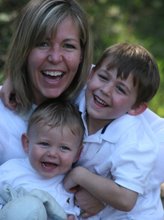Since I was diagnosed with colon cancer in February, I have had three friends who were inspired (or panicked??) by my experience to reach out to their doctors and schedule a colonscopy for themselves. For two of the women, colon cancer ran in their families, which is what made them take action. And the third friend was having digestive issues which concerned her. All three are women my age, all have young children at home, and all three are very physically active. None of them -- like me -- fit the profile of what most doctors would expect for colon cancer.
And yet, two of them wrote and told me that their doctors found and removed polyps during the colonoscopy (luckily, the third friend got a clean bill of health and peace of mind!) And as you may remember from one of my earlier postings, polyps are often a precursor to colon cancer. Removing the polyp removes the cancer (or pre-cancer) completely and this is why colon cancer -- if caught early enough -- is very treatable and very curable. The trick, though, is to catch it early -- hence, scheduling yourself in for a screening colonoscopy before you even have symptoms.
My one friend wrote to thank me for "saving her life." She said that her doctor initially did not want to approve her having a colonoscopy at her age and wanted her to wait until the recommended age of 50, but because of me and because of her family history of colon cancer, she persisted until he finally gave in. As it turns out, she had three polyps removed and, if she had followed her doctor's advice, I have to believe that she probably would not have lived to see the age of 50!!
In the course of my treatment, I have also learned of another incredibly sad story. A woman who was a classmate of mine at Kellogg was diagnosed a few months ago with stage 4 colon cancer. Her cancer has spread to her lungs -- ironically, she was having chest x-rays done in order to figure out why she had a persistent cough when they discovered the cancer in her lungs and traced it back to colon cancer. She is also roughly my age with a young child at home. From what I have heard through mutual friends, she also had a family history of colon cancer and yet her doctors mis-diagnosed her digestive symptoms for the past two years as simply "irritable bowel syndrome." And now, it sounds as though her cancer has progressed to the point of being uncurable.
I could go on and on...Through this whole ordeal I have met a number of other women -- all of whom are also roughly my age -- who are battling either stage 3 or stage 4 colon cancer. You'd think that I would be somehow reassured by these other women; that it would be a comfort to me that I am not the only one going through this, but the reality is that I find it horrifying!! How is it that so many young women -- who clearly do not fit the typical profile for colon cancer -- are being diagnosed with this dreadful disease?!? How can it be that so many of us go mis-diagnosed for so long? Why is this happening?!?
I was asked recently to help the American Cancer Society in my area with a marketing campaign that they are undertaking: they are hoping to increase the screening rates for colon cancer with doctors in our area and want help in coming up with the strategy and execution of the marketing plan. "Sign me up!" I said, "I would LOVE to help!" I cannot think of a better way to use all of the years of marketing experience that I have accumulated than to help ensure that other people -- especially young women!! -- receive the screening necessary to prevent this awful disease. I'll keep you posted on how the plan unfolds, but I can already tell you the main message: Get Yourself Screened for Colon Cancer Now!!
Tuesday, September 4, 2007
Subscribe to:
Post Comments (Atom)




2 comments:
Keep fighting, Julie!!!!!
I have colon cancer in my family and what the experts seem to say is that starting 10 years prior to the age when your family member had cancer, you should start getting colonoscopies every 1-2 years, and they should become yearly once you have reached the same age your family member was when they had the cancer. This is the recommendation for first degree relatives (mother, father, sibling with colon cancer). (Example: if your dad had colon cancer at age 37 yrs, you should start colonoscopies every 1-2 yrs when you are 27 yrs and then they should become yearly when you are 37 years). I do not know what the recommendation is for more distant relatives with colon cancer.
But I agree with you, it is never too early to start the screening!
There are national guidelines, developed by a panel of colon cancer experts, to help guide patients and doctors about what to do here. Here is the summary: Not everyone with a family history of colon cancer needs yearly screening. This actually applies only to people who have something called hereditary nonpolyposis colorectal cancer, otherwise known as Lynch syndrome, which is a very particular type of hereditary colon cancer. There are certain criteria that define the Lynch syndrome; most people with a family member with colon cancer don't have the Lynch syndrome. It is true, however, that everyone needs to be screened starting at age 50, and if you do have a 1st degree relative with colon cancer, screening 10 yrs prior to the age that person was diagnosed is a good idea.
Post a Comment